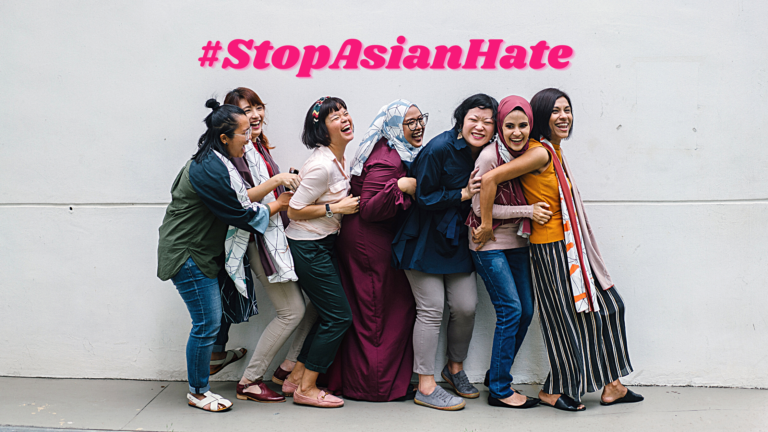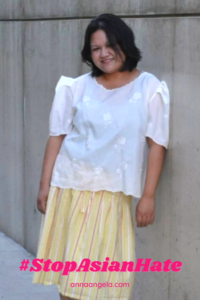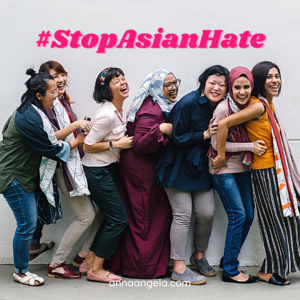“You know what immigrants sound like? The passion of the Christ when they’re killing him. Disgusting.” Those were the words said to me by a man at the grocery store. Said so casually. Said so full of hate. I have been trying to write this post for a while now. The words don’t seem adequate enough to convey my thoughts and feelings. At the same time, they feel overused. Shouldn’t we all know better by now? How much longer and louder do we have to say the words? Stop Asian hate.
The Asian community is vast and I am part of it. I am Filipino. Filipinos first arrived to the United States when they landed in Morro Bay, California in 1587. I landed in California in 1996, and for the most part, I haven’t directly faced racism because my particular community is full of Asian immigrants. I wish I could say that I was more shocked at the racist words that man hurled at me, but I’m not. There was a blatant rise in Asian hate and crimes against Asians during the pandemic and it hasn’t abated. Even though recent years have shown a lot of recognition and celebration of Asians in media and entertainment, racism towards Asians is still strong.
The Grocery Store Incident
What I’m (for) now calling the grocery store incident happened last March, and every time I look back on it, I’m stuck on replaying what happened. I was walking at the back of the store, past the bakery, and he turned from an aisle and walked slightly behind and to the side of me. I saw him assess me, and like any unwanted attention, I ignored him while keeping my inner radar alert, especially when I didn’t see other shoppers near enough to feel safe. Then he said it. He spewed his hate for me based on the color of my skin, while inadvertently hating on my faith.
I walked on and didn’t react. I wanted him to feel ignored. I didn’t want to give him the satisfaction that his hate landed and made any impact. At least, not until I could blindside him, too, by reporting him, which I did. My local grocery store is filled with people of color and immigrants, shoppers and employees alike. I had a lot of hope the store employee would listen. Yet briefly I wondered what I’d do if they didn’t believe me. It already felt like that man took something away from me, basic human decency maybe. But if nobody believed me, I would have felt robbed and silenced. It is dehumanizing to be treated with that kind of hate. It’s an act of love to restore dignity to someone who was robbed of it.
Thankfully, the employee believed me. She immediately called for a manager. When explaining what happened, I told the employee that I was okay. I just didn’t want that man harassing someone else. But I wasn’t okay. I wasn’t okay with the racism. I wasn’t okay with feeling like a burden for speaking up and reporting what happened. I wasn’t okay and I think she saw that. She was watching over the self-checkout area and I had trouble working the machine I used weekly. I was more shaken than I wanted to admit in the moment. I wanted to be brave, strong, and resolute even when I felt none of those things.
Looking back, I regret giving the man an excuse he didn’t deserve. He smelled like marijuana. I told the employee that perhaps he’s too high to be thinking or acting clearly. I recognize now that it’s part of how I was processing my experience. I still hate that I did that. There’s no excuse for his behavior. There are a lot of people who get high or drunk and never utter anything racist. Those substances lower our inhibitions and impair our judgement. They don’t turn people racist. They allow the racism already inside a person to come out.
As I finished talking to the employee, the man fell in line at the self-checkout lane. I pointed him out, and was told that they’ve had previous trouble from that same man. The manager had arrived and was ready to take action. With dread, I asked if I had to stay. The employee kindly said no. Immediately, a weight lifted off my shoulders because I don’t like confrontations. I especially didn’t want to play he-said-she-said to someone who hated me for no reason other than the color of my skin. I wanted to remove myself from the situation as far and as fast as possible. But situations like this tend to stick with you.
AAPI Heritage Month
May is Asian American Pacific Islander (AAPI) Heritage Month. I thought I could write this post by then, and throughout the month, share with you my heritage and how we can stop Asian hate together. But I didn’t have it in me. Like many people in the BIPOC (Black, Indigenous, People of Color) community, I was too tired to shoulder the burden of teaching other people that racism is wrong and different ways to be anti-racist. The information from much more articulate people is at our fingertips. Yet you’re here and I’m thankful for your time. So here are three things we can do to stop Asian hate: Educate, Uplift, and Speak Out.
Educate yourself about the AAPI community, our different cultures, and contributions. The AAPI community really is vast and the term encompasses a lot of countries. So how do you start? Start with one. Look at your community and the learn about the Asians already in it. Or learn about an Asian culture you’re not as familiar with. Might I suggest Filipinos (and yes, I’m biased).
Also educate yourself about the Model Minority Myth. It is a tool used to create divisions between minority groups by singling out Asian Americans as the model of success in the midst of racial injustice. People and organizations use it to erase or downplay the existence of systemic racism. Even among Asians, the Model Minority Myth is very dangerous. Throughout history, it has elevated light-skinned Asians over darker-skinned Asians, creating an even deeper racial divide. It is a racist way to control the BIPOC community, seeking to disintegrate our collective efforts to fight for equality and equity for all minority groups. Be aware of and don’t perpetuate the Model Minority Myth.
Uplift AAPI voices. Read, listen, and buy products by AAPI creators. Share them with your family, friends, and social circles on and off line. Ask for our stories.
Speak Out against racism. Speak out against Asian hate. We’re stronger together. “Isang Bagsak” is a Tagalog (Filipino) phrase that translates to one fall or one down. It’s an activist chant that have been used in different movements throughout history among Filipinos and Filipino Americans. The sentiment is this: together we fall, together we rise.
It’s time to stop Asian hate. It’s time to stop racism. Isang Bagsak.




